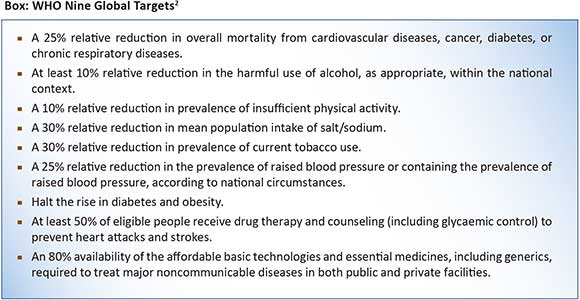Two reports published by the World Health Organization (WHO) in recent years, Global Action Plan for the Prevention and Control of Noncommunicable Diseases 2013–2020 and Global Status Report on Noncommunicable Diseases 2014, highlight the need for immediate action to control and prevent noncommunicable diseases.1,2
The 2014 report focuses on the status of each of the nine voluntary global targets for the prevention and control of noncommunicable diseases (Box). These targets were first adopted by the World Health Assembly in 2013 and the goal is to achieve them by 2025.

Can pharmacists in your country, based on the existing scope of practice, contribute to achieving these global health targets? Are pharmacists in your country prepared to tackle these targets? How or how well are they contributing to the achievement of these targets?
The value of clinical pharmacist services in achieving individualized goals for the management of patients with various noncommunicable diseases has been shown. This is especially true in developed countries where clinical pharmacy practice is well established. But more work is needed in order for pharmacists to systematically confront, attain, and document the outcomes for each of the nine targets delineated by the WHO at the national and global levels.
Calls to ministries of health, other health-system leaders, and policy-makers to support the expanding role of pharmacists in the realization of key health care goals have been made. The technical report published by the IMS Institute for Healthcare Informatics identifies five primary recommendations with low-spending levels, highly improved health outcomes, and rapid time from initiation to effectualness that ministers of health and other health-system leaders can implement to effect the responsible use of medicine and save billions of dollars in global health spending. Among these are (1) support for the greater role of pharmacists to own medicines management for patients and to collaborate with physicians for revision, and (2) support of targeted disease management programs for high-risk patients with chronic diseases such as diabetes to ensure timely therapy initiation.3
At the national level, The Expanding Role of Pharmacists in a Transformed Health Care System, published by the National Governors Association of the United States, calls for exploring ways to better integrate pharmacists into teams of health care providers, especially into chronic care delivery teams, in which medication management has the potential to improve health outcomes and the treatment of chronic diseases.4 This association, members of which are the governors of the 55 U.S. states, territories, and commonwealths, identifies priority issues and deals with matters of public policy and governance at the state and national levels. The paper includes a call to amend existing state laws and regulations to allow pharmacists to practice within the full scope of their professional training.
Given the varied landscape of health care systems and pharmacists’ scope of practice between countries, each country will need to strategically identify how to maximize pharmacists’ contributions to improving human health. Global and national actions by all stakeholders will continue to be crucial for the optimal provision of clinical pharmacist services and the effective realization of health care targets.
- World Health Organization. Global Action Plan for the Prevention and Control of Noncommunicable Diseases 2013–2020. Available at www.who.int/nmh/events/ncd_action_plan/en. Accessed January 30, 2015.
- World Health Organization. Global Status Report on Noncommunicable Diseases 2014. Available at www.who.int/nmh/publications/ncd-status-report-2014/en. Accessed January 30, 2015.
- IMS Institute for Healthcare Informatics. Advancing the Responsible Use of Medicines: Applying Levers for Change. October 2012. Available at www.imshealth.com/deployedfiles/ims/Global/Content/Insights/IMS%20Institute%20for%20Healthcare%20Informatics/Responsible%20Use%20of%20Medicines/IHII_Advancing_Responsible_Use_of_Meds_Report.pdf. Accessed January 30, 2015.
- Isasi F, Krofah E. The Expanding Role of Pharmacists in a Transformed Health Care System. Washington, DC: National Governors Association Center for Best Practices, January 13, 2015. Available at www.nga.org/files/live/sites/NGA/files/pdf/2015/1501TheExpandingRoleOfPharmacists.pdf. Accessed January 30, 2015.